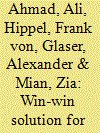|
|
|
Sort Order |
|
|
|
Items / Page
|
|
|
|
|
|
|
| Srl | Item |
| 1 |
ID:
142270


|
|
|
|
|
| Summary/Abstract |
This article examines possible modifications of Iran’s IR-40 (Arak) heavy-water reactor that would limit its plutonium production without compromising its usefulness for civilian purposes. The proposed modifications only involve the fuel composition, avoid changes to the fuel and core geometry, and therefore have the advantage of minimizing the overall complexity and cost of conversion as well as shortening the time period required to implement these modifications. The suggested changes would significantly reduce the reactor’s production of plutonium from 7–9 kilograms to less than 1 kilogram per year. The article also examines key safety parameters, medical isotope production rates, and uranium resource requirements for all modifications considered. The analysis is relevant beyond the case of Iran’s Arak reactor and may provide some future guidance for converting other heavy-water reactors that continue to operate today.
|
|
|
|
|
|
|
|
|
|
|
|
|
|
|
|
| 2 |
ID:
149857


|
|
|
|
|
| Summary/Abstract |
The shortage of electrical energy has led Pakistan to a severe energy crisis. A huge mismatch of demand and supply forces the utilities to resort to load-shedding. To overcome this chronic problem the people need to either conserve energy or use some means to fulfil their energy requirements during the load-shedding hours. An easier approach in this regard is the utilization of an uninterruptible power supply (UPS) at user ends. However, due to the absence of any Governmental regulations the Pakistani markets are flooded with low-quality, locally-made UPSs. In this context it was decided to conduct this research, i.e. to explore the impact of these UPSs on the Pakistan's power system.
|
|
|
|
|
|
|
|
|
|
|
|
|
|
|
|
| 3 |
ID:
183212


|
|
|
|
|
| Summary/Abstract |
Interest in nuclear power has grown in some Middle Eastern states despite poor economics, seismic activity, and attacks on nuclear facilities in the region. This article assesses risks from cesium-137 release and dispersal from spent nuclear fuel fires at Barakah in the United Arab Emirates and Bushehr in Iran to public health, the water supply, and the food security of major Persian Gulf cities. Doha, Dammam, Al-Hofuf, and Manama are most at risk of receiving 1.5 MBq/m2 for a spent fuel fire at Barakah, while a spent fuel fire at Bushehr could affect Shiraz, Ahvaz, Basrah, and Kuwait City, albeit at lower probabilities. Absent a decision to end nuclear power in the region, options for reducing the potential risks of spent fuel fires on Persian Gulf populations include the timely transfer of spent fuel from pools into safer dry cask storage, multilateral disaster-response planning, and a commitment not to attack nuclear facilities.
|
|
|
|
|
|
|
|
|
|
|
|
|
|
|
|
| 4 |
ID:
130326


|
|
|
|
|
| Publication |
2014.
|
| Summary/Abstract |
In November 2013, Iran and the P5+1 group of countries (China, France, Germany, Russia, the United Kingdom, and the United States) agreed on a six-month Joint Plan of Action to enable negotiations on a final settlement to contain the proliferation risks from Iran's nuclear program. This interim agreement freezes Iran's enrichment capacity, thereby preventing a further shortening of the time Iran would require to produce weapons quantities of highly enriched uranium (HEU) if it wished.1 This enrichment capacity has expanded greatly over the years since it first came to international attention in 2002. Iran and the P5+1 also have agreed on the need to constrain Iran's option to produce plutonium for weapons using the reactor that is under construction near the city of Arak and that will be under International Atomic Energy Agency (IAEA) safeguards. Under the Joint Plan of Action, Iran has agreed to freeze the Arak reactor project for six months.2 It also has committed not to separate plutonium from spent nuclear fuel or construct a facility capable of doing so. These are important interim commitments. According to Ali Akbar Salehi, the head of the Atomic Energy Organization of Iran, the Arak reactor is intended for radioisotope production and testing of nuclear fuel and materials. In response to the P5+1 proposal that Iran scrap the Arak reactor project, Salehi stated that "we see no point stopping the work on this reactor." He has acknowledged, however, the international community's concerns about the Arak reactor and offered the possibility of design changes "in order to produce less plutonium in this reactor and in this way allay the worries and mitigate the concerns.
|
|
|
|
|
|
|
|
|
|
|
|
|
|
|
|
|
|
|
|
|